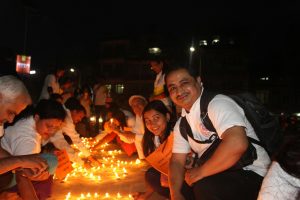Apart from health and economic crises, the COVID-19 pandemic has also fueled a crisis for democracy around the world. According to a new report from Freedom House, governments around the world have eroded the essential pillars of democracy creating a crisis for global freedom. In Nepal as well, the government has used the pandemic to limit expressions of public resentment by prohibiting protests at the Maitighar Mandala.
The Maitighar Mandala, a prominent public space at the heart of Kathmandu, is traditionally used by the public to assemble freely and exercise their right to freedom of expression. On a normal day, groups of people assembled there to express their support for a cause or dissent peacefully. However, right after the pandemic lockdown, the scenario has changed. Assemblies are now prohibited at the Mandala, and are limited to the southern road at the Maitighar. This restriction by the state may appear innocuous. However, the move can be seen as a part of a larger plan to systematically narrow public spaces for protests in a way that curtails dissenting voices.
The Mandala is a historic public space which has witnessed both small and large public protests catalyzing changes in the nation. Its location — in proximity to the office of federal government (Singh Durbar), Supreme Court, and the federal parliament at New Baneshwor — lends it its importance; thousands of people pass through that area every day. Therefore, protests there draw a lot of attention – from the media, the government, and the parliament.
In a democratic system, the right to peaceful protest is fundamental and receives special protection as a civic liberty of citizens. It is a medium for the public at large to express their dissent and grievances against state and its affairs. It is also a safety valve that stands to reduce violence and manage public aspirations by allowing the public to vent its anger peacefully.
The Special Rapporteur of United Nations (UN) Human Rights Council requires state authorities to facilitate the holding of public gatherings, social protests, and demonstrations and ensure that they can be carried out, seen, and heard by the target public in the space chosen by the organizers.
The Nepal government’s moves do not adhere to this principle as the designated southern road is covered by trees and bushes that act as a veil to cover the dissenting voices. It prevents dissenters from meeting the objective of protest, which is to deliver their messages. Plainly put, the move suppresses the voices of citizens.
The rationale behind these prohibitions is not random; neither it is for traffic management in the city. To understand it, we need to refer to the attitude of the Oli government toward dissenters. Since its formation, the government has been intolerant toward criticism. On several occasions the prime minister, his ministers and advisors blatantly labelled its critics as prejudiced. It also did not fail to attack both the media and social media for criticizing the government. The formulation of draft laws like the Information Technology Bill and the Media Bill to gag dissenting voices is a fine example of the undemocratic manner in which the Oli government has approached those who do not agree with it.
This is not the first time the government has attempted to prohibit the use of public space for protests. In April 2018, the government prohibited protest, demonstration or gathering at some prominent public spaces in the valley including Maitighar Mandala; only seven places were designated for such assembly in a way that isolates them. That decision of the government was challenged in the Supreme Court, following which the court issued an interim stay order on the prohibitions.
The case is still being heard. However, against the interim order of the Supreme Court, the police have arrested people for assembling at the Mandala on the basis of orders of the chief district officer.
These prohibitory orders against assembly in public spaces were expedited as COVID-19 cases grew. The state arrested hundreds of youths, from the Baluwatar and Maitighar Mandala, who came to the streets seeking government accountability after issues of graft and negligence in dealing with COVID-19 surfaced. The attitude of the government toward the protesters was one of indifference; their arrests undermine public trust and transparency.
Government authorities will defend the prohibitions as an attempt to manage traffic and security. However, it is essential to understand that protests are also legitimate use of public space along with other routine use. The U.N. Special Rapporteur provisions that protest should be prohibited only if it qualifies the test of necessity and proportionality. Peaceful assembly with rare, minor traffic disturbances does not pass this test. Even, while balancing the right to protest and right to free movement, the right to protest at public space prevails in democratic nations.
However, Nepal’s leadership seems very troubled by criticism and dissenting voices. The government wants to push all dissenting voices away from its eyes and ears. The prohibition of peaceful protests at prominent public spaces like Mandala is a case of encroachment of freedom of expression. Such moves of the government impact the very essence of democracy by undermining public confidence upon which a government is built.
Suraj Ray is a Kathmandu-based independent researcher.

































